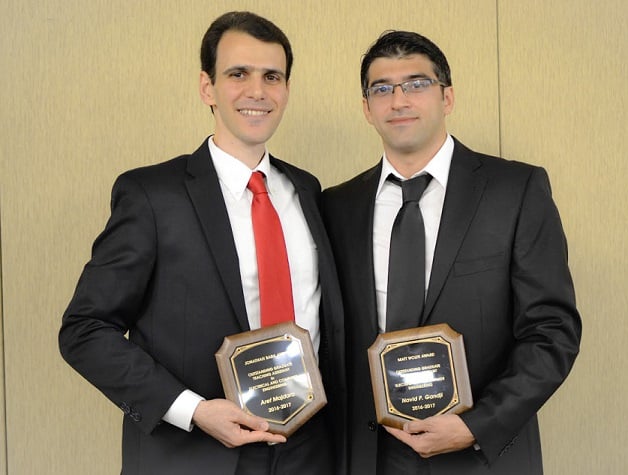
This week, as our Computing and Information Sciences Working Group is building up some steam investigating how computing is handled academically and structurally at other universities across the country, I have been thinking about how computing here fits into our role as a technological university. That leads naturally to the question of “what is a technological university, anyway?” but today I mostly want to address some issues of language and ask the even more fundamental question “what is technology?” I will conclude with a few thoughts about the language we use to describe computing.
“Technology” is one of those things where everybody has some vague idea of what it means, but pinning down a definition is tricky. In the time-honored tradition of sermons and speeches everywhere I’ll start with a collection of dictionary definitions:
(Merriam-Webster)
1.a. the practical application of knowledge especially in a particular area : ENGINEERING
b. a capability given by the practical application of knowledge, e.g. a car’s fuel-saving technology
2. a manner of accomplishing a task especially using technical processes, methods, or knowledge, e.g. new technologies for information storage.
3. the specialized aspects of a particular field of endeavor, e.g. education technology
(Oxford English Dictionary)
1. a. the branch of knowledge dealing with the mechanical arts and applied sciences; the study of this.
b. the application of such knowledge for practical purposes, esp. in industry, manufacturing, etc.; the sphere of activity concerned with this; the mechanical arts and applied sciences collectively.
c. the product of such application; technological knowledge or know-how; a technological process, method, or technique. Also: machinery, equipment, etc., developed from the practical application of scientific and technical knowledge; an example of this. Also in extended use.
2. A particular practical or industrial art; a branch of the mechanical arts or applied sciences; a technological discipline.
OED also list 3 obsolete definitions not included here.
1. the branch of knowledge that deals with the creation and use of technical means and their interrelation with life, society, and the environment, drawing upon such subjects as industrial arts, engineering, applied science, and pure science.
2. the application of this knowledge for practical ends.
3. the terminology of an art, science, etc.; technical nomenclature.
4. a scientific or industrial process, invention, method, or the like.
5. the sum of the ways in which social groups provide themselves with the material objects of their civilization.
(The Free Dictionary)
1.a. the application of science, especially to industrial or commercial objectives.
b. the scientific method and material used to achieve a commercial or industrial objective.
2. electronic or digital products and systems considered as a group: a store specializing in office technology.
3. (Anthropology) the body of knowledge available to a society that is of use in fashioning implements, practicing manual arts and skills, and extracting or collecting materials.
There are others, but this is enough for now. There are several take-aways from this collection, and the first is that the definitions are all over the map. This creates an opening for me to take issue with some of the definitions and furthermore describe my own perspective. For starters, that first Merriam-Webster definition that equates technology with engineering is just flat-out wrong and they should know better. The OED definition that equates technology with the “mechanical arts” seems stuck in the First Industrial Revolution and ignores all the advances in the past 200 years due to human knowledge of electricity, chemistry, materials, biology (not to mention computing – more on that shortly). There are some circular definitions in there, such as any of the ones that use the word “technical” which I assume has a similar etymology. However, the area that I think is most interesting is how these definitions describe a relationship with “science.” Let’s look at that.
Contrary to what a lot of people might think, science is not a collection of complicated and hard-to-understand laws of the universe. Rather, it is a human endeavor, by which we as a species attempt to figure out how the world works. At its heart is the scientific method, by which we look at the world, try to form a rough guess about what is happening in it, then form hypotheses which we attempt to prove or disprove using experiments. When I say “the world” I mean a lot of different things; it could be the hard physical laws of physics, like light or gravity or electromagnetism, or it could mean the nature of matter, as in chemistry, or it could mean complex life systems from biology. “The world” can also include systems that human beings are a part of it, such as in economics, social sciences, or psychology. The point is that science is all about uncovering the truth, to the best of our ability. The truth might be simple, or it might be complex, but it is what it is.
When the definitions above refer to the application of science to industry and commercial applications, they do not really mean science, they mean the laws of nature and our understanding of them. What we do as human beings is use our understanding of the laws of nature in order to exploit them (in a good way, usually) to make tools – things that did not exist before in nature – and thereby improve the human condition. This leads us into the territory of engineering.
Like science, engineering is a human endeavor, by which we take advantage of our understanding of the physical and natural world, combine that with our intellectual capacity, and create useful things that did not exist before. Where science is concerned with the truth, engineering deals with what is possible. Engineers are essentially tool builders, and as such the engineering profession embodies much of what it means to be human. These tools could be simple, or they can be enormously complex, but either way they are the product of human creativity. For most of the 250 years since the beginning of the First Industrial Revolution, engineering has meant the creation of physical things whose operation relied the principles from physical laws of nature like Newtonian statics and dynamics, thermodynamics, electromagnetism, chemistry, and the like. In the last 50 years or so the concept of systems engineering and control systems has brought an additional layer of complexity that is highly mathematical and is more about organization than the laws of physics, but nevertheless I think most people associate engineering with the development of physical tools – cars, airplanes, telephones, power grids, bridges, chemical plants, and so forth.
When I say that engineers build tools that did not exist previously, it sounds like I am saying that engineering is the same as invention, which is not really true. The distinction has been blurred in the past few decades, where there is so much emphasis placed on innovation and entrepreneurship in engineering schools. Even our own Michigan Tech tagline “Create the Future” suggests we want our students to go out and invent things. While engineering practice can lead to inventions that are, in the words of the U.S. Patent Office “new, useful, and nonobvious”, it does not always have to be that way. A lot of what engineers do is take well-known principles and skills and apply them in new situations, for example in the design of a new airplane or a power plant. The work can be evolutionary, not revolutionary. Imagine a skilled homebuilder: he or she may design and build beautiful houses all over town, but does not apply for a patent for each new house just because it is different than the one before. A lot of engineering is like that too, just with a different set of objectives.
This brings us back to the original question of “what is technology?” Looking over the set of definitions, the ones most closely aligned with what I mean when I use the word are Merriam-Webster 2 (“A manner of accomplishing a task…”), OED 1c (“The product of such application…”) and dictionary.com 5. This last one is interesting: “the sum of the ways in which social groups provide themselves with the material objects of their civilization.” That’s really catchy. What all of these are saying is that technology does not mean the knowledge or the process by which we build tools, it refers to the tools themselves. As that last definition makes clear, what we mean by tools covers a lot of territory, but the key element is that they are the products of our own human imagination, applied to the materials we find around us. Science provides us with the process for understanding how the world works, engineering is the process by which we create tools and extend what is available to us in nature, and technology is the result. These thoughts are echoed nicely and expanded further in http://researchpedia.info/difference-between-science-engineering-and-technology/.
If one buys this line of reasoning, then it means that the purpose of a technological university, if it is true to its name, would be education and scholarship in the ways that we as a society provide ourselves with the material objects of our civilization. I’m good with that.
So where does computing fit into all this? I think we would all agree that, if we are talking about the tools of 21st-century civilization, then computers, computation, artificial intelligence, information systems, and all the related things you want to put into that bucket, are a big part of what we would call technology today. But what are the words that we use to talk about that? Engineering is the well-established term we use to describe the process for creating physical tools, but what about the analogous process on the computing side? I assert that there is no word or phrase in the English language that adequately captures the process of creating new cognitive tools. This may very well be the reason why we have such a hard time recognizing computing as a discipline, when we compare and contrast it to the field of engineering.
Some of the options available to us are:
1. Computer Science. I think this term is a misnomer and its very existence is holding the field back. While one can easily argue that there are some scientific aspects to CS, where one actually does experiments to test hypotheses about algorithms or computer systems, by and large Computer Science is not science. Of the four terms in the STEM acronym, Computer Science is more mathematics, more engineering, and more technology than it is science. Unfortunately we are stuck with it.
2. Computer Engineering. This is an accurate descriptive term but its use is limited. It generally means the application of the tools of electronics, integrated with low-level software, to the creation of computers and computer systems. It can also mean the use of cognitive tools to control engineered physical systems (going the opposite direction, one might say) but these days I prefer the terms automation/ or cyber-physical systems for that.
3. Software Engineering. This is a wonderfully accurate term but again it refers to a narrow slice within computing. It means the process of creating computer code that meets modern industrial standards for large projects written by teams. Most CS majors would probably be better off as Software Engineering majors if they are looking to become professional programmers.
Before all my CS friends come to my door with torches and pitchforks, let me say that I have tremendous respect for everything that has been accomplished in the past 50 years under the name of Computer Science. Here we are in the Fourth Industrial Revolution where all our physical tools are connected, sensed, and controlled using cognitive tools, and that is the result of the extraordinary efforts of a lot of very smart people, many of whom are graduates of CS departments. I am only saying that the name is wrong. We need a word that describes all of the human effort and the human process that goes into building those cognitive tools, and Computer Science just doesn’t cut it for me.
My own wholly inadequate answer to this lexicon quandary is to use the word “Computing”, as I have already done in this column. I like it because it is simple, a one-word gerund that nicely parallels the word “Engineering.” It is its own word: it is not Science, it is not Technology, it is not Engineering, it is not Mathematics. The reason it is inadequate is that it sounds too much like what you do on a computer, and that is pretty narrow, but I don’t know what else to do. When I use the term Computing, I mean it to encompass the wide range of human activities that result in the creation of new cognitive tools. Here at Michigan Tech, we find that activity all over the place, in the CS Department, in the ECE Department, in the Math Department, the School of Business and Economics, in the School of Technology, pretty much every department in the College of Engineering, you name it. I am convinced that if we could find the right word to describe all that activity, our view of that field as a scholarly discipline would change entirely.
Next week is Thanksgiving. Among many other things I am thankful for those of you who read these random musings on a more-or-less weekly basis. FWF next week is doubtful, so unless inspiration strikes from a leftover turkey sandwich I’ll write again in two weeks. Have a wonderful holiday!
– Dan
Daniel R. Fuhrmann
Dave House Professor and Chair
Department of Electrical and Computer Engineering
Michigan Technological University
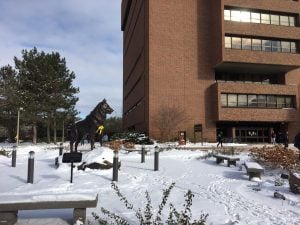 A couple of weeks ago I reported with barely contained glee that winter was on its way. I was right. We got a few inches of additional snow this past week, and for the time being it is sticking around. Thursday night temperatures plunged into the single digits in the western part of the Upper Peninsula. The cross-country ski trails at Michigan Tech are open, and I plan to be out there on Saturday. It’s a good time to make sure I have all the right gear, or at least remember where I put it at the end of the season last year. It’s nice to have the ski season start a little early for a change.
A couple of weeks ago I reported with barely contained glee that winter was on its way. I was right. We got a few inches of additional snow this past week, and for the time being it is sticking around. Thursday night temperatures plunged into the single digits in the western part of the Upper Peninsula. The cross-country ski trails at Michigan Tech are open, and I plan to be out there on Saturday. It’s a good time to make sure I have all the right gear, or at least remember where I put it at the end of the season last year. It’s nice to have the ski season start a little early for a change.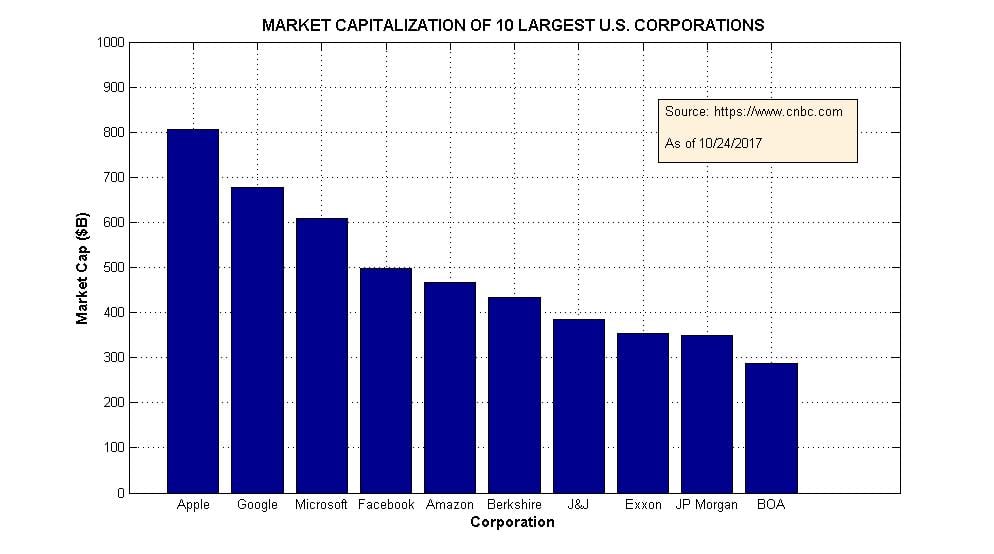
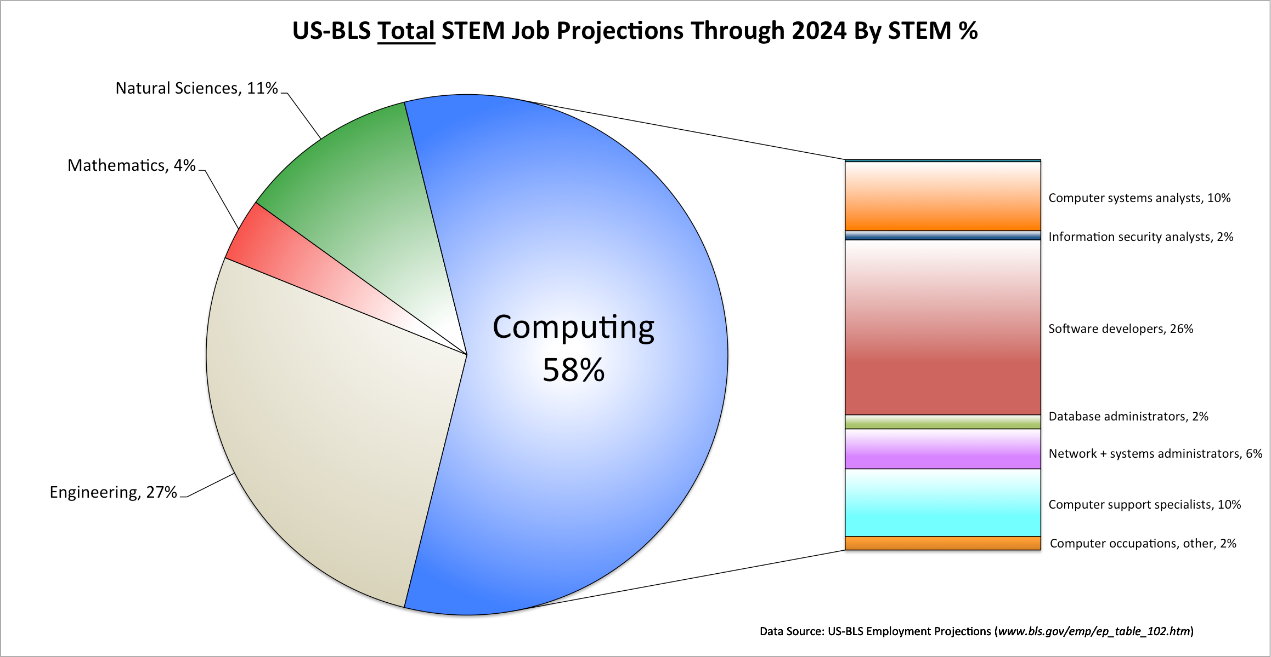
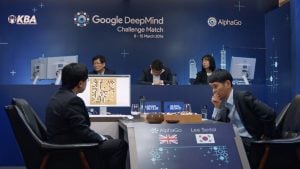 Tonight’s viewers of
Tonight’s viewers of  I have mentioned before the old canard that there are two seasons in the Upper Peninsula: Winter’s Here and Winter’s Coming. While this obviously does not do justice to our beautiful summers, there is definitely a Winter’s Coming season, and it just arrived. After a rather late, warm, and wet fall, we had a storm blow through here on Tuesday with cold rain and 50-60 mph winds that was like a shot across the bow. Although the landscape is still dotted with a few bright yellow trees that weren’t quite ready to quit, for the most part our woods are bare. The forecast now includes rain/snow mix and other reminders of what’s to come. It’s the time when we put the driveway stakes in the ground, tune up the snowblowers, and make sure our snowplowing contracts are in place.
I have mentioned before the old canard that there are two seasons in the Upper Peninsula: Winter’s Here and Winter’s Coming. While this obviously does not do justice to our beautiful summers, there is definitely a Winter’s Coming season, and it just arrived. After a rather late, warm, and wet fall, we had a storm blow through here on Tuesday with cold rain and 50-60 mph winds that was like a shot across the bow. Although the landscape is still dotted with a few bright yellow trees that weren’t quite ready to quit, for the most part our woods are bare. The forecast now includes rain/snow mix and other reminders of what’s to come. It’s the time when we put the driveway stakes in the ground, tune up the snowblowers, and make sure our snowplowing contracts are in place.
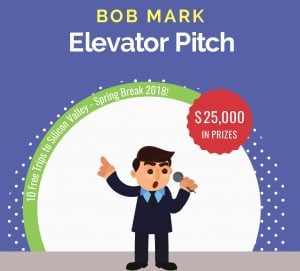 EE major Cameron Philo received “Best Green Innovation” at the 2017 Bob Mark Elevator Pitch Competition held Saturday in the Van Pelt and Opie Library.
EE major Cameron Philo received “Best Green Innovation” at the 2017 Bob Mark Elevator Pitch Competition held Saturday in the Van Pelt and Opie Library. 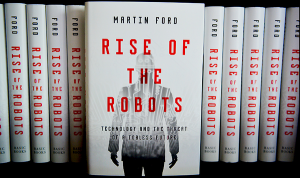 Last weekend Michigan Tech was privileged to host Silicon Valley entrepreneur and writer Martin Ford, author of the NY Times bestseller Rise of the Robots, which is all about the disruptive changes in the recent past and future in the areas of robotics, control, and automation, and the implications for our society and our economy. I was able to join Mr. Ford for a couple of different question-and-answer sessions with interested faculty, and to attend his presentation at the Rozsa Center which was open to the general public. I found the entire day to be stimulating and compelling, and I was very happy about the fact that Career Services and the Rozsa Center were able to work together and pull this off. The evening presentation was very well attended and included a lot of students. I was impressed that so many people were willing to give up their Saturday to hear a PowerPoint presentation about automation – but it really was that good.
Last weekend Michigan Tech was privileged to host Silicon Valley entrepreneur and writer Martin Ford, author of the NY Times bestseller Rise of the Robots, which is all about the disruptive changes in the recent past and future in the areas of robotics, control, and automation, and the implications for our society and our economy. I was able to join Mr. Ford for a couple of different question-and-answer sessions with interested faculty, and to attend his presentation at the Rozsa Center which was open to the general public. I found the entire day to be stimulating and compelling, and I was very happy about the fact that Career Services and the Rozsa Center were able to work together and pull this off. The evening presentation was very well attended and included a lot of students. I was impressed that so many people were willing to give up their Saturday to hear a PowerPoint presentation about automation – but it really was that good.